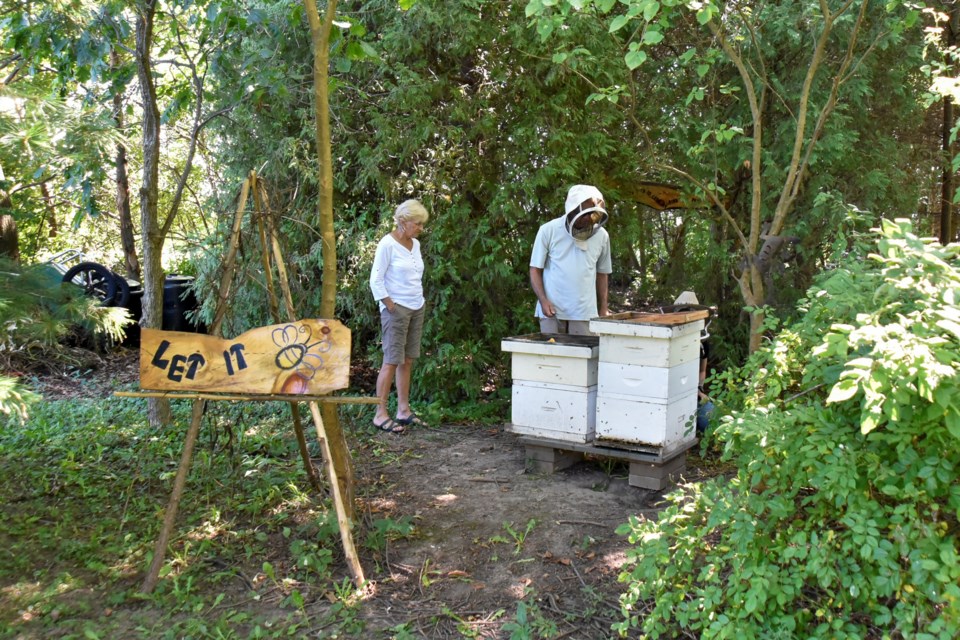Niagara Beeway has long been known for its bee rescue service throughout the Niagara region, but few people know that the owners have spent 25 years restoring native habitat for the protection of endangered species.
The 50 acres of land started out as a dormant field used for growing corn and soya beans, and is now a re-naturalized woodlot with meadows and grasslands that are home to many threatened or endangered species. They have documented 50 species of bees, butterflies and moths, rare woodpeckers, bobolink, meadowlarks, wood ducks, quail, snapping turtles, eastern bluebirds, tree swallows, salamanders, snakes, frogs, owls, bats, flying squirrels, osprey, eagles, wild turkey, deer, fox and coyotes now living on the property.
Niagara Beeway has recently restructured as a not-for-profit organization in order to offer their expertise and services on biodiversity to the local Niagara community. The new organization is called Niagara Bee Group and their main focus will be on the creation of habitat for the preservation of bees and pollinators, as well as other species under threat in Niagara. The key component of the organization is to provide education and services to groups, schools, municipalities, farmers or individual land owners who want to create sustainable, biodiverse ecosystems on their land. More than 300 people have offered their land to protect bees, but funding is needed from corporate sponsors, endowment funds, or donations to turn these lands into suitable habitat.
The process begins by planting pollinator meadows or grasslands which provide food and breeding habitat for the targeted species. Honeybees will be placed in the meadow to kick start the ecosystem through pollination. Once the native plants get established, the honey bees will be removed so that native bees can populate the area. Bees continue to die in Niagara at an astounding rate due to urban development and chemical contamination in the environment. Pollinator meadows will provide sanctuary for many species of native bees that are struggling to survive. Seed production is also a great benefit and can serve as seed banks in the future.
Once the meadows mature, they will attract beneficial insects, bees and butterflies who in turn attract birds who feed upon their caterpillars. In addition, Niagara Bee installs bird breeding chambers for cavity dwellers and bird houses for other targeted birds to nest in. If the property is appropriate, nesting platforms for birds of prey can be erected and a nest camera can be installed for educational purposes. Once an ecosystem is established it can be self-sustaining indefinitely with little maintenance.
Niagara Bee Group can supply native plant species to start pollinator meadows, restore existing habitats, or to re-naturalize brownfields, urban developments, schoolyards, or under-utilized lands such as beneath powerlines or old landfill sites.
Their mission is to create a network of these habitats throughout the entire region of Niagara. Using their highly qualified team of professionals, which include an agronomist, professor of ecological ethics, professional beekeeper, pollinator and native plant expert who all work together to provide the necessary skills to take a project from planning to completion.
Niagara Bee Group will continue to offer neighbourhood pollination services through the Host A Hive initiative. This program allows private individuals to host hives on their properties which are serviced and maintained by professional beekeepers at Niagara Bee. Placing small groups of bee hives throughout the region will ensure that local trees, gardens, flowers, vegetables, and fruits will continue to be pollinated. As native bees and other pollinating insects continue to decline, they will need the help of honey bees to get this job done.
As commercial beekeeping slowly disappears, communities and neighbourhoods will have to rely on hobby beekeepers to provide the necessary pollination services to farms and municipalities. If you are interested in sponsoring hives on your property, be sure to reserve your hives early as quantity is limited. For more information contact Niagara Bee Group
Detailed information about their programs can be found on their website: www.niagarabeegroup.com
The team at Niagara Bee Group is very hopeful about the future of Niagara and is proud to be part of a community filled with people who really care about preserving its beauty. They would like to thank those who have supported them in the past as Niagara Beeway and hope that you will continue to support Niagara Bee Group by sponsoring beehives, fundraising or donating to their cause.
